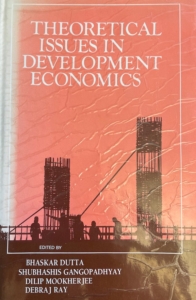Games and Economic Behavior 6, 162-177, 1994.
Summary. Recent literature in the theory of dynamic games addresses renegotiatioin-proof equilibria, For repeated games, I analyze the limit of renegotiation-proof equilibrium sets as discounting vanishes. The main result states that such limit sets must either be singletons or belong to the Pareto frontier of the convex hull of the feasible set of the stage game payoffs.
 (edited with Bhaskar Dutta, Shubhashis Gangopadhyay and Dilip Mookherjee), Oxford University Press, 1992.
(edited with Bhaskar Dutta, Shubhashis Gangopadhyay and Dilip Mookherjee), Oxford University Press, 1992.